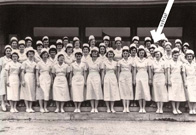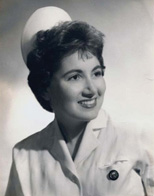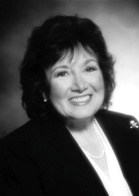"Nurses are much more active in health policy and political affairs. They are congresswomen, state legislators, leaders in public health and private foundation."
Registered Nurse, Professor
Professional Career:
After graduating from Adelphi in 1954 with a Bachelor of Science in Nursing, Sylvia Fields’ first job was as a general duty nurse at Mt. Sinai Hospital in New York. Teaching the aides and practical nurses she worked with made her realize that she enjoyed teaching and missed being in school. To continue her education, she requested the night shift at Mt. Sinai, and enrolled in a daytime graduate program in education at Columbia University.
 Her next few years were busy ones. Dr. Fields worked as a nurse, took an education class, was married, moved to Boston, taught fundamentals of nursing at Massachusetts General Hospital, moved back to New York, taught at The Lutheran Medical Center, and took more education courses. She received a master’s degree from Teachers College, Columbia University in 1960.
Her next few years were busy ones. Dr. Fields worked as a nurse, took an education class, was married, moved to Boston, taught fundamentals of nursing at Massachusetts General Hospital, moved back to New York, taught at The Lutheran Medical Center, and took more education courses. She received a master’s degree from Teachers College, Columbia University in 1960.
After moving to Long Island, her teaching career took her to associate degree programs at Queens College and then SUNY Farmingdale. When called upon to teach maternal child health, she returned to Columbia part time at first to focus on the academic background for that specialty. Armed with a traineeship, she took leave and went to school full time. Her original plan was to become an associate degree nursing school dean, but the Vietnam War was raging, and Columbia was a hotbed of activism. Dr. Fields found herself becoming politically active in health care as the co-chair of the Nassau County Abortion Law Committee. Through this experience, and the award she received from Planned Parenthood for her work, she realized she wanted even more to address the issues of prevention, patient education, and access to health care. As challenges were taking place nationally in health care delivery systems, Dr. Fields changed her educational objectives to focus on the newly developing roles for professional nurses in primary care through baccalaureate and higher education programs.
Dr. Fields gave up a tenured position at SUNY Farmingdale to accept a position as associate professor at the new Health Science Center School of Nursing at SUNY Stony Brook. With a certificate from Adelphi in Primary Care, and training by the Medical School at Stony Brook, Dr. Fields worked with one of the deans to develop a variety of instructional materials for new curricula. Together they wrote the Guide to Patient Evaluation, the first textbook specifically for nurses learning to expand their roles. In 1974, it won the American Journal of Nursing Book Award. Concurrently she helped develop and teach a course for students in medicine, nursing, dentistry, allied health and social welfare, “An Interdisciplinary Approach to Patient Evaluation.”
 While continuing to work on her doctoral degree focusing on inter-professional curricula and teaching, she taught B.S.N. students expanded skills and helped develop a Graduate Nurse Practitioner Program. At the same time she traveled monthly to Albany New York to work with a group of nursing faculty from across the state to develop the Health Assessment Performance Exam of the New York State Regents External Degree in Nursing, the first such program in the country.
While continuing to work on her doctoral degree focusing on inter-professional curricula and teaching, she taught B.S.N. students expanded skills and helped develop a Graduate Nurse Practitioner Program. At the same time she traveled monthly to Albany New York to work with a group of nursing faculty from across the state to develop the Health Assessment Performance Exam of the New York State Regents External Degree in Nursing, the first such program in the country.
In 1978, with a new doctoral degree in hand, Dr. Fields moved to the warmer climate of Atlanta, Georgia and became Director of Undergraduate Education in the Nursing School at Emory University. She enjoyed her administrative and teaching activities, as well as new inter-professional program activities with medicine and nutrition, but continued to write and consult with several publishing companies. And a new challenge soon arose.
In 1982, Dr. Fields accepted an offer from the F.A. Davis Company, a medical publishing house in Philadelphia, to lead their medical publishing unit. She traveled across the country to attend conferences and meet leaders in medicine in order to interest and assist physicians in producing clinical monographs and student textbooks. Dr. Fields is particularly proud of several very important books she developed; the first book on heart disease in women, and the first on cardiovascular disease in African Americans. Other highly regarded texts were written for and by nurses and physicians collaboratively, An Interprofessional Approach to Pacemaker Therapy and McGoon’s Cardiac Surgery: An Interprofessional Approach.
In 1990, after doing her share of traveling, Dr. Fields moved across the city to the Center for Research in Medical Education and Health Care at Jefferson Medical College of Thomas Jefferson University. As Coordinator of Community Health Programs and then Director of the Generalist Physician Initiative in the Medical School, she wore several hats, writing grants and developing innovative research, curricula, and teaching activities. Major research themes included nurse/physician attitudes and relationships, and the theme of “empathy” in inter-professional and international studies. Today there is a Center for Collaborative Studies at Jefferson continuing the work Dr. Fields promoted.
In 1995, with her husband anxious for retirement, Dr. Fields moved with him to Savannah, Georgia. But she wasn’t quite ready to retire; still working at Jefferson, she traveled weekly between Philadelphia and Savannah. After she finally retired in 1997 and moved full-time to Savannah, she was able to still be a long-distance consultant and research associate for Jefferson, continuing to publish papers in medical and nursing journals. She also began to volunteer in the Savannah community, particularly with Backus Children’s Hospital where she wrote the grants to develop two early literacy programs, “Born to Read” and “Reach Out and Read.”
Later, looking for part-time work in nursing, Dr. Fields answered an ad in the paper for a nurse/executive at the Savannah Health Mission. This is a free evening health care clinic in the local community hospital for the uninsured, which is staffed by volunteer working physicians and nurses. She was hired immediately, and recognizing the significant need for expanded services, wrote grants and raised the funds necessary to change her position to full time. Under her direction, the clinic prospered, adding a health education and prevention program including nutrition, exercise, and alternative modalities for health promotion.
In 2006, when public and private funds became harder to attract, the Savannah Health Mission merged with another facility; Sylvia chose to retire once again. But as you can guess, retirement didn’t keep Dr. Sylvia Kleiman Fields home long. Today you can find her teaching Introduction to Research, Professionalismand her old specialty, Health Assessment in the Nursing School of Armstrong Atlantic State University. “I am teaching…but also learning,” says Dr. Fields. “I have to stay a page ahead of my challenging and diverse B.S.N. students.” Next semester she will add a graduate course in Health Policy. “Now that’s going to be exciting,” she says.
Dr. Fields received the Nursing Scholarship and Research Award and was inducted into the Nursing Hall of Fame at the Teachers College of Columbia University in 2003. She is listed in the Who’s Who in America Women (1985) and Who’s Who in American Nursing (1992).
Dr. Fields has three children who she is proud to say have absorbed her work ethic; they are passionate and hard-working. Her five grandchildren are also following in her footsteps. This past winter, Dr. Fields and her family enjoyed being together in New Orleans for the holidays.
When and why did you first want to become a nurse?
 I needed half a credit to graduate from James Madison High School in Brooklyn. I told my adviser that the course I would need to take could not be trigonometry, because I just did not want any more math. She suggested I earn the half credit by taking Home Nursing. I knew nothing about nursing, didn’t know any nurses, and had never been in the hospital, but agreed, just because it was not trigonometry. At the end of the course, my teacher Mrs. Quinn told me that I was smart, compassionate, and would make a good nurse someday. She suggested I apply to the nursing program at Adelphi. While discussing Adelphi’s program, Mrs. Quinn mentioned that during the third and fourth years, students lived in the nurses’ residence at a hospital on Long Island. As a girl living in a one bedroom apartment in Brooklyn, sleeping on a twin sofa bed in the living room, I always wished I had my own room, a quiet place to study. The opportunity to have a room of my own drew me to becoming a nurse. With the blessing of my parents, I took the subway from Brooklyn to the Long Island Railroad and the Long Island Railroad to Garden City every day for my first two years at Adelphi. It was worth it; the campus was beautiful and the education was marvelous.
I needed half a credit to graduate from James Madison High School in Brooklyn. I told my adviser that the course I would need to take could not be trigonometry, because I just did not want any more math. She suggested I earn the half credit by taking Home Nursing. I knew nothing about nursing, didn’t know any nurses, and had never been in the hospital, but agreed, just because it was not trigonometry. At the end of the course, my teacher Mrs. Quinn told me that I was smart, compassionate, and would make a good nurse someday. She suggested I apply to the nursing program at Adelphi. While discussing Adelphi’s program, Mrs. Quinn mentioned that during the third and fourth years, students lived in the nurses’ residence at a hospital on Long Island. As a girl living in a one bedroom apartment in Brooklyn, sleeping on a twin sofa bed in the living room, I always wished I had my own room, a quiet place to study. The opportunity to have a room of my own drew me to becoming a nurse. With the blessing of my parents, I took the subway from Brooklyn to the Long Island Railroad and the Long Island Railroad to Garden City every day for my first two years at Adelphi. It was worth it; the campus was beautiful and the education was marvelous.
Do you have favorite memories of your time at Adelphi and your residencies?
My most memorable class was one I took my second year at Adelphi: Community Surveys. Every weekend 45 nursing students went to a religious service in a different ethnic community in Manhattan. Afterwards we would have lunch with the congregation to sample their food, sometimes hear their music and learn about their culture – especially where it concerned the common health problems that they faced and their beliefs about illness and health care. It was the first real exposure to different cultures and religions for most of us. My career through the years has demanded my presence in diverse multicultural settings, and I have always been able to make friends across societies communicating with students, patients and colleagues as a result of that course. If you can understand why I enjoyed this course so much, you can understand why I am passionate about nursing: above all, nurses provide comfort, and one cannot comfort if one does not understand what is comforting to each individual person.
Nothing made me prouder than the first day I put on my starched nurse’s uniform, complete with little white cap, shoes and stockings. I felt so important. I’m sorry today’s professional nurses gave up this traditional dress that helped distinguish our role and foster respect from patients and colleagues across disciplines.
During my three month residency at Creedmore State Hospital I cared daily for Ann, a 19 year-old college student who had a breakdown and lived between states of uncontrollable ranting and complete catatonia all those months. Even after a series of electro-shock treatments, she never seemed to get well. I introduced myself every day and wore a name pin in large letters on my uniform, yet she never once spoke my name. I tried hard to reach her, but when I left that rotation, I felt as though I had failed. To my great surprise, about a year and a half after I graduated, I saw this Ann again. She was working at Bloomingdale’s and she remembered me (and my name!) and she thanked me for caring for her. Can you imagine how joyous I was that day? Thanks to the advent of a new drug called Thorazine, she was now living with her mother and sister, and was planning to go back to complete college. This was the real beginning of advances in health care that I have seen during my life time.
Recently I called Adelphi to request my transcripts. I was worried, thinking there was no way they would still have my information. I spoke to the registrar, and she assured me they still had it. She said, “We [Adelphi] told you that when you first came here your education would last a lifetime!” We both laughed. This is so true.
What are some changes you have seen in nursing throughout the years?
Patients often don’t know who the professional nurse is anymore. Patients should know a nurse when he or she walks into the room; by the walk, the “talk,” the smile, and the way business is conducted. I know it is not going to happen, but I wish we could go back to female nurses wearing white uniforms, with their hair pulled back, and no hanging earrings.
I have always been disturbed by the negative image of nurses displayed in the past by the media. I know many of our colleagues are working to change those images today.
I believe the extensive increase in research and graduate study, and particularly the professionalism of nurse practitioners, nurse clinicians, and midwives, has resulted in more respect and appreciation for the contribution nursing makes in our diverse communities. Studies have shown that higher education of nurses results in less errors, safer care, shorter hospital stays, lower costs, and more satisfied patients.
I’m glad to see more men, minorities, and older students, those already with college degrees from other disciplines, entering the profession; quite a few of my students, male and female are veterans returning from Iraq.
Nurses are much more active in health policy and political affairs. They are congresswomen, state legislators, leaders in public health and private foundations; the President of The Pew Foundation is a former emergency room nurse and researcher. I want us to continue to work for the image of the nurse as an educated, humanistic, scholarly professional.
I am glad to see that along with more respect from patients, physicians, and administrators, salaries for nurses have increased. Our salaries are just starting to reflect our value to society; it has been a long, hard fight.
What advice would you give to today’s nursing students?
Recognize that as a nurse, you are going to be learning for the rest of your life; take joy and pleasure in this. You will learn so much from the changes you experience and you will benefit. Be open to all opportunities; you will discover your potential. Never turn something down because you think you don’t know enough. Go out and learn what you need to know, and don’t give up because something seems difficult. There is only more to gain. You will be proud of yourself.
Know that you are important. Nursing is not just a job; it is a career with soul, respected for its level of ethical behavior. Feel good about the meaning to your life nursing brings; it will keep you young!
Because I use this book in my professionalism course, read the “7 Habits of Highly Effective People,” by Stephen R. Covey. It will give you the framework for success; you can find a way to apply the habits in your personal life, with your family relationships, and in any nursing role you wish to assume.
For further information, please contact:
Todd Wilson
Strategic Communications Director
p – 516.237.8634
e – twilson@adelphi.edu